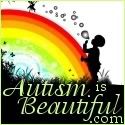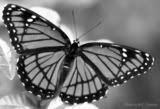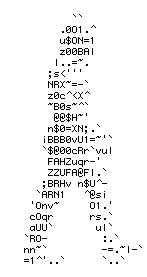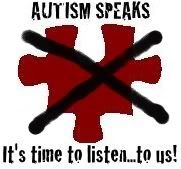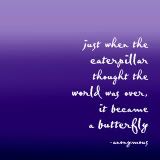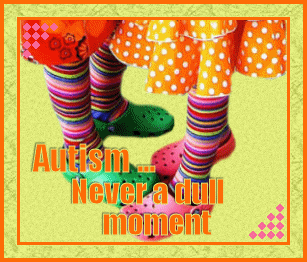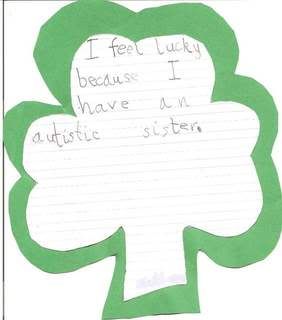
"I feel lucky because I have an autistic sister."
While words don't seem necessary for this picture, I feel I must add some information. I fear this type of imagery might bother some folks. For starters, this assignment was done by my eldest, at school. I had no idea such a project was coming up, and didn't learn about it until it was sent home a few days ago. Just so those doubters know, I didn't suggest this to my child, there was never any discussion about it. My daughter completed this at school, and never mentioned it to me. Each child in class was given a clover to write what they feel lucky about. These were then displayed in their room.
When I first saw this, I felt mixed emotions. I was taken aback that that is what my daughter would choose to feel lucky for. Simply because when it comes down to it, she could have chosen her friends, material objects, summer vacations--anything. Also, since she has expressed some sadness about her sister--how at times she feels that her little sister doesn't love her, and is sometimes confused as to why her sister acts the way she does.
We've always had an honest and open dialogue with our eldest. We've never hidden things from her. The day we received the autism diagnosis, we sat down with her and told her. In an appropriate manner, we explained how "autism" simply gave a name to how her sister was. That it didn't change her, it wasn't a sickness, this wouldn't mean more hospital stays. We also told her that autism wasn't the reason for everything her sister does--that sometimes, her little sister is simply being a little sister (aka a pain in the butt to big sis!). We gave her a book, I've mentioned it before.
From there on in, we've always welcomed conversations with her. We don't judge her, and let her work through whatever emotions she is feeling. We are also always sure to let her know that having any brother or sister is not a cake walk. My husband and I relay stories of growing up with 4 siblings a piece, and the drama involved in that. We always give her perspective, we avoid pity parties, but we also always listen with an open ear, and give her plenty of reassurance. She's been upset at times, feeling her sister gets more of our time than her (the remedy was extra effort on our part to have "dates" with her, just her and I or she and my husband). We've made a special bin in her room, for her to go to when her sister is having a bad (loud) meltdown (she has an mp3 player with headphones, arts & crafts stuff, etc.). See, despite what some think, we are realists. We don't skip along, being oblivious to how autism affects our autistic daughter, her sister, or our family. We do our best, we are honest and open, we are not ashamed, we choose to focus on the positive, and look forward always.
Given all of that, and simply the difficulty I see in their day to day interactions, this clover was quite a surprise. Trust me, there are plenty of sweet and tender moments between them. Our oldest has been the best "teacher" for our youngest. Our little one has quite a patient, bright, and loving big sister, and we are so grateful. I never thought I'd hear my daughter say she felt lucky to have her little sister. My surprise moved to pride. Words can't express how amazed I am at my daughter's perspective on her sister, and on people in general. I also felt proud of my husband and I, obviously we are doing something right.
From their, a tinge of embarrassment grew. I, quite frankly, felt odd and wondered what her teacher, and anyone else who saw this clover would think. Like my husband said, jokingly, "maybe we sold it [autism] a little too well." A few days ago, I was volunteering at the school. I was speaking to the Life Skills teacher and she was telling me how much she loves my little one. My older daughter's teacher passed by, and we met up further down the hall. She asked if I had seen the clover. I told her I had, and how sweet I thought it was. She said she was so moved by that, and how wonderful it is to see how much my daughter loves her little sister. Hearing the teacher's take on this clover, made me realize I had no need to be embarrassed or feel awkward over it. My daughter, at her young age, is herself changing people's minds and advocating for her younger sibling. Does it really get any better for that?
3/30/08
My Autism Everyday: Lucky. Indeed.
3/26/08
Autism: The Musical
 I watched it tonight on HBO. Well, actually I just got done watching it on my DVR. If not for that, I'd never catch a show on television (other than what my daughters choose!). Just before the "opening night" in the film, my daughter started screaming. I went to her room, she was screaming over something I wasn't able to make sense of. I picked her up and she settled down. I brought her into the living room, continued watching Autism: The Musical. She rested beside me, and fell back asleep. Just as the movie was ending, she says, "that was good movie." I guess she heard the audience applaud, and figured it must be good! She then went on to talk about a "pop" that "boke" (she unexpectedly got to the tootsie part of a tootsie pop the other day, it quite disturbed her!). This morning, she woke up screaming over her trike that needs some repairs. I'm always amazed at how much is going through her mind, at all times. I digress, back to the film (little one is now back to sleep in her room--for now)
I watched it tonight on HBO. Well, actually I just got done watching it on my DVR. If not for that, I'd never catch a show on television (other than what my daughters choose!). Just before the "opening night" in the film, my daughter started screaming. I went to her room, she was screaming over something I wasn't able to make sense of. I picked her up and she settled down. I brought her into the living room, continued watching Autism: The Musical. She rested beside me, and fell back asleep. Just as the movie was ending, she says, "that was good movie." I guess she heard the audience applaud, and figured it must be good! She then went on to talk about a "pop" that "boke" (she unexpectedly got to the tootsie part of a tootsie pop the other day, it quite disturbed her!). This morning, she woke up screaming over her trike that needs some repairs. I'm always amazed at how much is going through her mind, at all times. I digress, back to the film (little one is now back to sleep in her room--for now)
I loved a lot about the film, there were some parent's views I disagreed with (what else is new). I'm at the point where I am well aware that I won't agree with all the people all the time. I've even reached a stage where I don't care so much what someone else's views are, so long as their concerns and goals are in tune with mine. I am more than willing to work with someone who blames vaccines for their child's autism, IF we are working to get say, a vocational program for adult autistics. We can all have our various beliefs, so long as we are moving forward, with our child's future being the utmost concern. I was able to watch this film, and appreciate it as a whole--even with the few sound bites I'd prefer not be a part of it. All in all, I felt it was an upbeat movie, one that celebrated autism (in its many forms!). It was wonderful to see so much of the spectrum depicted--verbal and nonverbal, asperger's and classic autism, boys and girls, many snapshots of autism.
I also liked that a recurring theme was the future for our children, what opportunities and services they may (or may not) have available to them. Hopefully, it can serve as a stepping stone for more of us to come together, to change our children's futures. There were a few absolutely wonderful moments in the movie, and I appreciated the rawness of the parent's emotions (without being dark and disturbing ala that other Autism "documentary"). I applaud the children and their families, who essentially went where others had never dared gone before. I have deep respect for Elaine Hall, who with humor and bravery followed through on her dream. Honestly--who would believe that a single mom could pull together a group of children (did I mention they are autistic?), and in six months have them perform in a musical?
According to their website, The Miracle Project (which will at some point have information on nutrition and education, something I may be weary of, we shall see) is planning on branching out to different cities. Right now, you can buy various packages (script, music, etc.) to put on your own "Autism: The Musical." I would be delighted to see such a program available to my daughter in the years to come. I think other projects involving art and music would also be wonderful as well; they could prove to be very beneficial to autistic teens. I am going to bed tonight, feeling a bit more positive about the future of autistics. If one person can create a program like The Miracle Project, and make such an impact--what can the rest of us do?
3/24/08
Seriously, Jenny
 I just caught Jenny McCarthy's interview on E!'s Chelsea Lately show. Here is the link (bad language warning). Really now, it is frightening who we have speaking to the public about autism and supposedly representing "us."
I just caught Jenny McCarthy's interview on E!'s Chelsea Lately show. Here is the link (bad language warning). Really now, it is frightening who we have speaking to the public about autism and supposedly representing "us."
She talks about how she asked Mormons to come pray for her "sick" son (and how when your child is sick you'll decapitate small animals, hmmm...). I wonder if this is before or after she discovered her child was a Crystal? To say that Ms. McCarthy was desperate for some type of hope for her and her son, is an understatement. I've never seen someone speak so frantically over their child's autism. No wonder she hopped onto the DAN bandwagon, and now is so 'into' TACA & Generation Rescue. One can only speculate what she may discover next, what group she'll become immersed in. Perhaps Dr. Carley will win her over?
We're not all screaming "HELP US!" At least we're not looking for the "help" you have been shoving down our throats for months. The help I want, is knowing that my school district has the proper resources and is giving my child all she needs to achieve her potential. The help I need is programs for my child and many others as they reach adulthood. I need help with transition from the school system, will my child have the opportunity to attend college? Will she be able to live independently, will there be housing options available to her? Is there vocational training available, and who will hire her? Will she be able to attain medical care, psychological services, etc. from reputable physicians? How will the world view an autistic adult in 10-15 years? If changes are not made, how many autistic children growing up today will be homeless in their 20's, 30's, or 40's?
She goes on to give the number to the White House, asking viewers to call and ask for the resignation of Julie Gerberding, CDC Director. Chelsea suggests telling the White House, "Julie Gerberding suck it hard!" and Jenny adds, "I was going to say aka the Devil." Nice. Later on, Jenny says she hopes "we create a major s**tstorm," over this issue. Lovely, now that's classy. I'm so glad that the public will look to Jenny and feel she represents all autism moms. I can only imagine what the media coverage will look like on that weekend in June when Jenny and her fellow Generation Rescue drones will descend upon the CDC. I wonder if their posters will have signs with the above mentioned quotes? Should be quite a circus.
The interview ends with Jenny stating that we (us autism moms) live in a kind of hell. Not me, no way, not by a long shot. Jenny, you want to know what hell feels like? For us, it was watching our child lay lifeless in the PICU. She had tubes coming and going, tests round the clock, she was essentially in a coma and no one knew why. We thought we were going to lose her. Jenny, that is hell, fearing that your child is going to die and you can do absolutely nothing about it, except pray every minute. Get some perspective. Life with autism is not this nightmare you are selling to whoever will listen to you. It's amazing that celebrities feel they can actually relate to moms in regular America. None of us can just go do a photo shoot to make some more money to cover our child's therapy. We don't have access to the press to speak up about our concerns and get funds raised toward what's really needed. You simply can't relate to us, and again, "we" don't live in a "kind of hell." And, besides, with your son "recovered," what exactly are you whining about?
In the very end, they both state that the government has said that vaccines can cause autism, as just decided in a recent court case. Really? Which court case was that, did I miss it?
3/22/08
Random Ramblings...
I'm currently working on about 8 different posts. One by one, I'll get them finished & ready to add here. I've read some great posts this week:
*As always, Dr. Kristina Chew on AutismVox has a week's worth of incredible writings. My favorite has to do with an upcoming art show, The Artistic Spectrum, something near and dear to me. I'm an artist, but more importantly, my youngest daughter is showing us signs of some incredible artistic streaks (one of her "savant" abilities beautifully shining through--yes, my child is "one" of those that the autism charities hate for the world to hear about). This story made me miss where I grew up, and wish I was there to catch this show. My mother was excited to hear about it, so hopefully she'll be able to see it. Anyway, this article and this art show fills me with so much hope for my child's future, I can imagine seeing her at such a show, getting her due respect & acceptance.
*Another great story, on Along The Spectrum. This Jersey Girl has been a fan of The Boss for as long as I can remember. Just ask my husband--how many times has he had to listen to me sing along to "Jersey Girl" or "Glory Days?" Stories like these, really remind us of the good that exists in this world (including rock legends). What a joy, to think of Eddie playing his heart out on that harmonica.
*An interesting piece on A Photon In The Darkness, on some new studies and how they dispute the GFCF diet "cure" and all those urine test results. Can't wait to see what the DAN! docs make up to blur this one.
*This from Life With Joey, a glimpse into a day in the life and I just love it.
*Welcome to The Rat Race, I can't wait to read more. I just may learn some more Italian while I'm at it (and make my father's family proud).
*Autism News Beat on Kirby's piece in the Atlanta Journal Constitution and holding publications responsible. Contact information for paper is available here as well. Let our voices be heard, once again!
Some things that really inspired & cheered me this week:
*A nice little trip with my family. It was relaxing and fun for all 4 of us, doesn't get much better than that.
*Seeing the pride in my husband, as he's bragged to whoever would listen about my blog's Forbes mention here, along with AutismVox, Neurologica, & Respectful Insolence.
*I'm not one who likes receiving praise necessarily, but it was nice to be applauded by family & friends for my writing.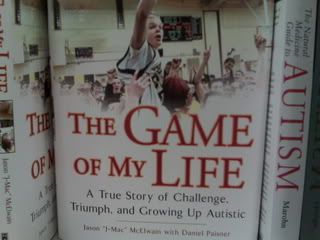 *Seeing this at the bookstore (can't wait to read it!). Sorry those who disagree with accepting (and forget about embracing!) autism or our children, but our stories are getting out each day, and our voices are becoming louder!
*Seeing this at the bookstore (can't wait to read it!). Sorry those who disagree with accepting (and forget about embracing!) autism or our children, but our stories are getting out each day, and our voices are becoming louder!
*My mother telling me she is trying to find an autism bumper sticker, but all she could find was an Autism Speaks one, she asks, "Now, that's not who I want to support, right?" I smiled. Her & I have had many a long-distance chat on these charities, adults services, curebies, anti-vaxers, etc. I loved knowing she 'got' it, and loved that she was doing her own part.
*She also told me about the news story she saw about Stephen Wiltshire (of whom I am a big fan of). She was in awe of him. We both agreed how nice it was to see a "good-news" piece on autistics and autism. Certainly, Lauren Thierry cringed when she saw a successful autistic, showcasing a talent. We can't have any of that, now can we?
3/18/08
The Money Trail...

Where will all the money raised by Toys R Us go?
Autism Speaks and Toys R Us have had a relationship for over a year now. This year, it appears, they are going all out. Which, like I said earlier this week, one can only wonder what all will come in April. In addition to the in-store donations, "the world's greatest toy store" is also accepting them online. At the time I write this, $539,448 has been raised (which, is up over $20,000 from the $519,229 they were at when I began drafting this last night). They are raking in, on average, more than $30,000 a day. Given that, they very easily could raise over 2 million dollars. This campaign began on March 2nd and continues until May 2nd. We all know where this money will go to: research, research, research--the Autism Speaks mantra. Of course, some money will go toward entertainment, catering, private jets, salaries to people like Allison Tepper Singer, and who knows--maybe an Autism Everyday Part II? Read about it on the Autism Speaks' website (their 2006 report, I can't wait to read 2007's). As Lisa Jo Rudy writes,
"Personally, I'm encouraged to see community grants and insurance issues are making it to the front page of the Autism Speaks website - though I'd love to see the organization create a division dedicated to living - and thriving - with autism."We shall see if Autism Speaks ever gets a clue and decides to actually support autistic individuals. Then perhaps so many of us wouldn't cringe when we checkout at the Toys R Us, turn on Oprah, or see that the Sundance Channel is premiering "Autism Everyday" on April 2nd. I won't hold my breath though. Here's how they prioritize those living with autism, as per the "goals" statement from their website:
We are dedicated to funding global biomedical research into the causes, prevention, treatments, and cure for autism; to raising public awareness about autism and its effects on individuals, families, and society; and to bringing hope to all who deal with the hardships of this disorder. We are committed to raising the funds necessary to support these goals.
Notice the order:
1. make LOADS of money for research into causes, prevention, treatments, and cure
2. raise public awareness (via depressing "documentaries" apparently)
3. and, if and when we get around to it, "bring hope to all who deal with the hardships of this disorder"
They never actually say they want to help autistics, or create programs for teens and young adults, or support job-training, independent living, etc. for adult autistics. Bringing hope is a rather broad term. What hope exactly are they bringing? That one day a "cure" might exist, or that prenatal screening will be available? Once again, painting the bleak picture of the "hardships" we live with is getting rather old by now. Now compare Autism Speaks' goals with The National Down Syndrome Society's values and The National Autistic Society's vision and mission statements. Keep in mind, also, that the NDSS began in 1979 and the NAS has been around for over 35 years.
I'm not sure what "puzzle" Autism Speaks wants the public to think they are concerned with solving. To those of us who take personal offense by their messages and continue to receive zero support from them, we understand what this "puzzle" is. They promote the idea that if your life is touched by autism, you are miserable, your child has been "stolen," you are in debt, your marriage is falling apart (if it hasn't ended horribly already), and your life is one long nightmare. When you combine those viewpoints, the statements made by the "leaders" of Autism Speaks, read over what research their money is going toward, and see their tax return, it becomes clear. The puzzle they are struggling to solve is how to end any future generations of autistics. They want nothing more than to annihilate autism, all together, all of it--all future autistics, and frankly nothing else. They've even convinced politicians like Hillary Clinton to make public statements about working to "prevent and cure anything along the Autism spectrum." As for the autistics living (and thriving!) today, well, let's just disregard them altogether.
Autism Speaks could learn a lot from The National Down Syndrome Society and The National Autistic Society. The day that Autism Speaks actually reaches out to Autistics, and makes supporting those individuals a priority, then perhaps I would like to "help autism" at the check-out line.

Would I like to "help Autism?"
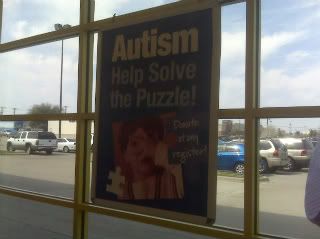 Good question. Not one I expected to hear at the toy store. Would I like to help autistics gain acceptance and reach their individual potential? Absolutely. Is Autism Speaks doing that? Not at all.
Good question. Not one I expected to hear at the toy store. Would I like to help autistics gain acceptance and reach their individual potential? Absolutely. Is Autism Speaks doing that? Not at all.
After surviving a trip to Toys R Us with my two kiddos, we were checking out. I heard the word "autism" uttered while I shopped, and wondered why. I was oblivious, walking through the store with my girls, of all the signs like the one above. I wonder why? Hmm..two girls, tons of toys for them to rummage through, and the occasional meltdown. Perhaps that was it? Or maybe I just never expected to see Autism Speaks' propaganda displayed throughout a toy store.
So, we are paying and the checkout associate says to me, "Would you like to donate a dollar to..."
And I am thinking, "sure!" I often give a dollar or two upon checkout--for diabetes, heart disease, cancer, and the local children's hospitals. The woman continues,
"...to help Autism?"
I actually let out a "hah!" It was just a funny question to be asked, given the company I was in. It took a second for the question to really set in. The woman looked at me oddly. I looked around, and then asked "where does the money go?"
"Autism Speaks" and as she said that, I saw the big puzzle poster above the register.
I say to her "no, thanks, we have other..." and I trailed off, realizing two things:
a. this woman was only doing her job & I got the idea she didn't care if I donated one way or the other
b. how much time do I really have to explain why I don't agree with Autism Speaks?
My older daughter looked up at me, and I knew what she was thinking (why don't you want to "help Autism" mom?). I bent down and whispered in her ear that we prefer to help in other ways. I think she too was amazed that "autism" came up while we checked out at Toys R Us.
As I finished paying, I saw a big roll of stickers by the register. They had the infamous puzzle piece, with the words "Autism" and "I helped solve the puzzle," along with the Autism Speaks and Toys R Us logos. It was at once surreal and all rather humorous to me (I have a sick sense of humor at times). The posters, the stickers, all of it.
So, we left with our bags. I paused in the exit area, and snapped the picture above with my cell phone. I'm not quite sure what to think of the poster. I suppose I should be glad that these pictures were not used: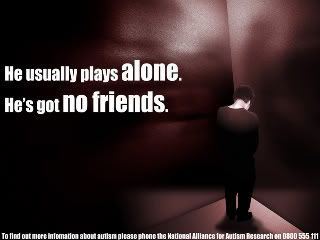 or
or 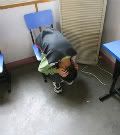
Those two often pop up if you Google "autism" in images. The first was used in an ad campaign by NAAR (now merged with, guess who, Autism Speaks). It's disturbing, actually, when you search for autism images. The majority are dark and depressing, others shout that mercury is poisoning our children. Pictures really are worth a thousand words. Unfortunately, from Autism Speaks,' TACA,'s and other similar groups' perspective, pictures are worth thousands of dollars and that is all they are concerned with.
The cute little boy, covering his face and all the puzzle pieces, plastered throughout Toys R Us? I honestly don't know what to make of it. I suppose I'm glad this image is different from the many others. The child is making eye contact, for one. I think having him cover his face was an attempt to make him look embarrassed, trying to hide (his autism?). But, as a parent, I saw a playful look, perhaps peek-a-boo or peeking while playing hide-and-seek?
3/17/08
So Long & Be Well, christschool
Well, I was going to add a video by christschool to my piece on Toys R Us & Autism Speaks. He had a great video about where all the money raised by AS goes. Sad to find out, while on youtube trying to find his video, that he has left. Only two of his videos remain. He is very talented with his videos, and I was always moved by them.
I was glad to find out that he is still very active in doing what he does best, changing the world and making it a better place for our children. Be well & be safe, I cannot wait to see all you will do in the future!
Please visit The National Autistic Society and, the up and coming National Autistic Society of America, both organizations truly for and by autistics.
If the video is not showing up above, click on the title to go to christschools' youtube page. For now, I was able to find a few of his videos here and here.
Let's Be Friends...Maybe
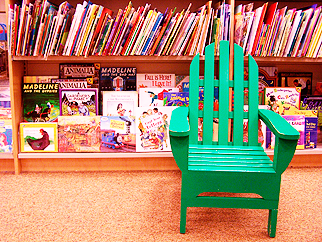 Barnes & Noble, Inc. has announced that 500 stores across the country will host special "Storytimes" for "Autism Awareness Month." They are partnering with, of course, Autism Speaks. I plan on writing about the various activities, publicity, et al that will surely come along in the month of April. There will hopefully be some really good, positive events. Time will tell what message Autism Speaks and others will deliver. All I know is, watch out (!!), because 2008 will surely be the loudest year for "autism awareness" and the many forms it comes in.
Barnes & Noble, Inc. has announced that 500 stores across the country will host special "Storytimes" for "Autism Awareness Month." They are partnering with, of course, Autism Speaks. I plan on writing about the various activities, publicity, et al that will surely come along in the month of April. There will hopefully be some really good, positive events. Time will tell what message Autism Speaks and others will deliver. All I know is, watch out (!!), because 2008 will surely be the loudest year for "autism awareness" and the many forms it comes in.
The fact that Autism Speaks is involved here, I am skeptical. But, from the initial looks of this, I feel it could be a good thing. The books featured on the Barnes & Noble website include "The Game of My Life," "The Autism Acceptance Book," and "Look Me In The Eye." Granted, there are others that I'd prefer not be on the list, but at least a few good ones are there. I have been contemplating ordering this book on Amazon (that will be featured for these events), as it seems to have a positive message. One of my favorite books for children is "My Friend With Autism" by Beverly and Craig Bishop (parents of an autistic child). This was helpful not only to our older daughter, but to family and friends too. It explains the various features of autism, but in a positive manner, like how "my friend" has super hearing, etc.
I will try and locate a copy of "Since We're Friends: An Autism Picture Book, and write my review here. Here is some of the information from the press release:
On April 2, Barnes & Noble stores across the country will host celebrity Storytimes in cities including New York, Los Angeles, Chicago and Dallas. Celebrities will read books that encourage compassion and respect for individuals with autism and other disabilities.
I hope that these story hours will really achieve that goal. Compassion and respect is what's needed most when it comes to how the public reacts to autism and autistic individuals. We have had enough years of fear and drama, let's move on already. Parents need positive support, encouragement (not stares!) from others when our child is having a meltdown in the store, and our schools need to think outside of the box to help our kids reach their potential. And, above all, we need to support adult autistics and their families. Autism Speaks is rolling in the dough, perhaps now they can focus on what autistic children and adults need more than anything: services and support, primarily in the teen and adult years.
"...Steve Riggio, chief executive officer of Barnes & Noble, Inc. "Our special Storytime events, in partnership with Autism Speaks, are a unique way in which we can help spread knowledge and promote understanding of this disorder, which affects so many children each year."
Again, I hope they are able to increase knowledge (in a non-stigmatizing way!) and increase understanding for the public and for the peers of autistic individuals.
...Suzanne Wright, co-founder of Autism Speaks. "These in-store events will do a great deal to foster a sense of tolerance and understanding, something families affected by autism desperately need as they face the many day-to-day challenges posed by this disorder."
A sense of tolerance and understanding? Wow, did I miss something here? Is Autism Speaks no longer talking about kicking autism to the curb or throwing away this generation of children? Are they no longer celebrating Allison Tepper Singer's disgusting confession? I applaud them if they've actually turned over a new leaf. I'm not naive though, and the images from Autism Everyday are still very fresh in my mind. It would be wonderful to have an April that focuses on the many gifts and talents of autistic individuals, on the joy that is to be found in life with autism, and the need for (adult) services and acceptance.
**As usual, bold added by the author!!!
3/14/08
My Autism Everyday: Autism Knocked On The Right Door
“Autism knocked on the wrong door.”
It's the quote heard round the world, from Suzanne Wright, co-founder of Autism Speaks and grandmother to an autistic child. It's been bounced around for a couple of years now, but it's one of those lines that always runs through my mind. It's really irritated me. It's supposed to be a rallying cry, I suppose. For anyone who has seen Autism Everyday, it starts to sound more like an invite to a pity party.
For me, I find it hard to separate autism from the individual. So, when I hear something like autism coming to the wrong door (family), I read this child came to the wrong family. A burden is deeply implied in that statement. I never prayed for a special needs child. During my pregnancy, I didn't dream of doctors' visits, surgeries, medication, or therapies. I don't think an expectant parent ever wishes for that. I remember thinking how easy the second-time around would be. We'd already been through the concerns and struggles first-time parents contend with. We were all done with that, we were seasoned veterans. People complimented my husband and I on our parenting skills, and we were applauded for the amazing "job" we were doing with our daughter. She was polite, outgoing, and intelligent. We received nearly all the credit for that. ;)
My second pregnancy was very different from my first. I was nauseas for the first 5 months, other than that, I actually felt better with my second pregnancy. I felt like I knew what to expect, the hows and whens of all that comes with bringing a new baby home and raising a child. We were so excited and couldn't wait to expand our family.
Our second child was blue and not crying when she was delivered. My heart sank, that is a horrible feeling. You expect joy and celebration in the delivery room. Not silence, with doctors and nurses descending upon your child, and nurses cautiously smiling at you, reassuring you it will be okay. I laid there, watching them assisting my little baby, trying to get her to breathe. My husband and I would nervously glance at one another, and then back to the crowd hovering over our baby. The medical team was successful, and started walking toward me so I could finally hold her. My sigh of relief was interrupted when the doctor paused and had to bring her back to the bassinet, she stopped breathing on her own, again. This time, she quickly responded to their help, I was able to briefly caress her cheek before they whisked her away.
That was my first clue that the second time around may not be a piece of cake. The next day, we found out our daughter had two holes in her heart. She also developed jaundice that required therapy for a week following her birth. Shortly thereafter, the reflux and stomach issues began. The bumpy road continued. It wasn't long before my husband and I realized that this was unlike anything we'd gone through with our first child. All the experience that we'd gained, all the answers we thought we had, now meant very little. I donated my "What To Expect The First Year" book, and realized my daughter was going to write her own book. I had to look within myself to find strength, not a book. We surrounded ourselves with supportive family and friends, and listened to the professionals we had sought out. It wasn't going to be easy--but how does the saying go? Nothing worth it ever is.
I believe that all the challenges I faced growing up, all the experiences I've had to this point, all prepared me for raising my child. I wrote early on, about not particularly liking the praise I receive for "how I am" with my daughter. To me, it's natural. I am her mother, we are her parents, we love her. That's all there is to it. Perhaps some of us have an innate sense of caring for a child with special needs and/or autism? Maybe there are those of us who deep in our hearts realize every child, every person, deserves respect? I suppose it is possible that there are some that are better-suited to raise an autistic child than others. I for one see my daughter as a blessing, she has taught us so much, and has brought great joy to so many. All of our family, friends, and neighbors have delighted in seeing her develop and blossom. They smile each time they see her.
I can say that Autism knocked on the right door. My daughter receives nothing but love, acceptance, understanding, and patience from us. I'm honored that I get to be her mom, and have her in my life. I am also so grateful that my daughter's grandmothers (and grandfathers, for that matter) have never and would never use such a phrase, when referring to her. No, instead they have offered nothing but love, encouragement, and prayers. They have supported us from day one, always willing to listen with an open-ear to our thoughts, and what we felt was best for our child. I know, that regardless of how of my child is doing 10 or 15 years from now, our family will be there for us, and more importantly, for her.
3/10/08
The Parents
My first inclination was to be harsh on the Polings, especially when they practically whispered "mitochondrial" in their public appearances. They wore outrageously huge Autism puzzle bows, I wondered where their mito pins were. I was rather confused, why would they not use a public forum for a disease that needs more resources for a treatment? You see, unlike Autism Speaks, U.M.D.F. doesn't have a flock of fancy celebrities as their spokespeople, they don't have comics and musicians plugging their cause, and they haven't had a film premiere at Sundance. There is a great need for money and resources to continue the studies into mitochondrial disease. All of this, in hopes of saving lives. That's why I was upset. I've known children who have died from mitochondrial disease. Why weren't we hearing about how serious it is, and where the public may donate to such a cause?
Well, I watched the Larry King Live interview with the Poling family. At first, I felt maybe they were tired from a long day. Perhaps the stress and excitement over the media blitz was getting to them. The first segment went by, and there was zero mention of mitochondrial disease. It was all about autism. Let's just say I was doing my own commentary for the show! After the commercial break, at some point, finally the "M" word was said. With each question asked during the interview, Mr. and Mrs. Poling seemed to get a little frazzled. They looked lost. I again figured it was exhaustion.
At the very end of the their appearance, this transpired:
J. POLING: I would agree with almost every word in that statement. In terms of vaccinations, I'm certainly not anti-vaccine. I think vaccines are one of the most important medical developments within the past century-plus.
What we're trying to say, and the theory of what we felt happened to our daughter Hannah, is that she has a susceptibility to injury from stress of vaccination or potentially stress with the mitochondrial disorder of other potential insults. But clearly, what happened with our daughter was following a series of vaccinations that occurred in July.
Later on...
KING: Terry, should a parent watching the show tonight, when the pediatrician says, come in for the vaccinations, should they bring them?
T. POLING: Oh, yes, definitely. There is no evidence that children are like Hannah. We don't know -- we didn't know, actually. I don't know that she had a mitochondrial disorder prior to July 19th of 2000. I had no evidence of it in any biological tests. I don't know if it was the vaccines, getting nine at one time, that caused it.
I'm sure she has a genetic predisposition for this. I don't think that every family member has that. I don't think that every family does. And as everybody knows, there's a lot of children out there that do no not --
SHOEMAKER: Thank you, Larry. I might add that one of the theories we were prepared to present in this case is the fact that mercury in the vaccine that were given back at that time can also lead to Mitochondrial dysfunction. In this case, we do not believe it was a genetic cause. We do not believe it was a cause.
Wait a minute. The lawyer just completely disputed what the parents were saying. Also, it struck me as odd that they are "pro-vaccine." The majority of families in the vaccine cases feel strongly that the shots poisoned their child. Some are for "greening" vaccines, others are flat-out against any and all vaccinations. And, it seemed strange that a family who had gone to court, to blame vaccines, is recommending getting your child vaccinated. I think something significant happened from the time this family sought out DAN doctors to the last few years living with their child's mitochondrial disease.
Something else also dawned on me. Could it be that the Polings have signed agreements with this vaccine-hating injury lawyer? Exactly how many other clients does he have? One look at his website is quite telling (just Google Cliff Shoemaker). If he presents the public with a victory against "big pharma" and "big brother," why he'd have thousands cheering and declaring victory. But, if a term like "mitchondrial disease" were to take center-stage, this concession would mean little to the others wanting their day in court. I just wonder, if there isn't an agreement between this lawyer and his clients.
I've been given information on Mrs. Poling, she was an avid DAN believer. I have nothing to show that she remains one, or that her husband is or was ever. It appears, according to message boards, that her involvement in chelation and DAN supplements began when their child was just 2 1/2. She does state that her child was diagnosed with "mitochondrial PDD" at Hopkins and lists off her abnormal lab results (these are the blood tests that will eventually lead the family to see Dr. Shoffner for biopsy & other tests). She adds how in a mercury article, abnormal lab findings are seen with heavy metal poisoning. She describes the "biological intervention meds" her daughter takes, along with some for her "metabolic problem." Again, this is all before the Mito Complex I & III diagnosis. She lists off the meds, pretty much the mito cocktail (the docs she saw suspected mito, most docs will put a child at-risk on the cocktail prior to testing). They are already doing chelation (at 2 1/2 years of age!) at this point. She was trying to get the Lovaas ABA covered through Early Intervention or the school district as well.
It also looks like when the muscle biopsy results and diagnosis of mitochondrial disease came in, her visits to the boards stopped (last post is 11/26/01, biopsy was done on or after 10/4/01, results generally take 12 weeks). Granted, there are other message board and offline support groups, so they very well might have continued at least some DAN methods. Honestly, if my child had such a debilitating regression (loss of skills, inability to walk, feeding difficulties, etc.), which we know Hannah did, I would be devastated. If the only answers I had were "regressive encephalopathy" and "autism features" from experts, I'd probably buy into the DAN way. How could my child go from one level of functioning, and then within months be so very different? It's also important to remember how convincing DAN doctors are, how their test results appear to connect the dots, and how they very easily sink their claws into people who feel desperate.
One can assume that, after receiving the mito diagnosis, at least some changes have been made to their DAN protocol. The use of chelation no doubt stopped, it's possible her diet had to be altered as well, but the "biomedical medicine" aka mito cocktail certainly continued. So, I am going to be easy on the Polings. I do not agree with the DAN protocol, but I can see how in desperation one would seek them out. I also realize that it's highly likely they have been given a script from their lawyer. It is my hope that sometime down the road, the family will speak out--on mitochondrial disease.
I wish this family the best. I hope that Hannah continues to make progress and grow, and that the physical symptoms of her Mitochondrial Disease do not affect her deeply. I assume at some point David Kirby and others will review the details of the case--both the medical and the legal facts. Hopefully, they'll understand that autism is not mitochondrial disease, and mitochondrial disease is NOT mitochondrial dysfunction. Perhaps in time, they'll clarify that while mitochondrial disease is a debilitating, often fatal disease, autism surely is not.
At some point, they will realize this case is not a victory for them, in fact it's a victory for no one. There are no winners here--not the lawyers, not the anti-vaxers, not Hannah. The Poling family has received money from this case, but their child will always have mitochondrial disease. And that, quite frankly, is nothing to celebrate.
The Holocaust & 9/11
That is what a "Dr." Rebecca Carley uses to compare vaccinations. She uses language like "holocaust of autoimmune diseases," calling vaccines the "true weapons of mass destruction," and ends her letter with, "Let's roll..."
To show such utter disrespect to the countless victims of the holocaust and of the September 11th terrorist attacks, how absolutely tasteless and unforgivable. For one, comparing autism to anything close to what those victims suffered is absurd. And for two, attempting to create the same passion one would have regarding the violence brought upon by extremists, to the autism-vaccine debate is appalling.
After reading her "theory," I have to say Kirby's fuzzy numbers don't look quite so bad. Seriously, though, she can't stand Kirby and is very fueled right now due to the "concession case." She, or her cohort(s), is posting messages on "recovery" boards, with that disturbing language referencing the holocaust and 9/11. It is a long, drawn-out manifesto, dropping plenty of scientific terms to almost sound legit. But, anyone with their head screwed on properly is quick to realize these are merely conspiracy-charged, senseless rantings.
She claims to have "reversed" all autoimmune diseases (including autism) and cancer in over 2,000 clients over the pas 9 years. This number includes pets. Although, it's not clear what percentage were animals who were "cured." It's scary to think she is posting her propaganda on these message boards. It appears to me, the parents there, may not have their heads quite screwed on. I wonder how many phone calls or emails she actually receives? The only hope may be that most of these parents worship David Kirby so much, they won't be swayed to try her "Hippocrates Protocol." Granted, I can't really say her methods are any worse than that of DAN!
She has a statement on her site, declaring she is NOT licensed to practice medicine and can never be licensed. The reason she gives? If she were to be licensed, it would be a "conflict of interest," and she would be forced to "promote" vaccinations. She further states she is not board certified. Why? A trend is appearing; she is not board certified because she is "developing the specialty" of "vaccine induced diseases, she refers to them as VIDS). She explains that "VIDS" is THE "umbrella under which...internal medicine, pediatrics,...psychiatry actually reside." Huh? At this point, is anyone really still calling and having this woman evaluate their child, or even their pet?
On this "doctor's" website, which is so very professional looking (sarcasm), she also detail the bizarre goings-on, in her words, about losing custody of her son. She has her story, and then there are the legal documents I have seen about this case. Let's just say they don't quite match up. She does, however, divulge that at the NYS medical board hearings, she was charged with having a "delusion of conspiracy." The list of folks I'd like to see charged with that seems to grow each day...
This is the first I have heard of this woman. Figured they were others who also had never come across her. The more you read from those "crusading" to rid the world of vaccines, the more your realize how lacking in scientific data and how nutty is. If you are interested, here's some more, on this "doctor":
http://quackfiles.blogspot.com/2005/04/rebecca-carley-md-disgrace-to-medicine.html
http://www.quackwatch.com/11Ind/carley1.html
http://www.neurodiversity.com/conspiracism.html
3/8/08
"Evidence of Mitochondrial Dysfunction In Autism and Implications for Treatment"
That caught your eye, huh? Please read this publication: www.scipub.org/fulltext/ajbb/ajbb42208-217.pdf
Sounds rather startling at first. But then, when you dig a bit further, the reality of it all gets much clearer.
First of all, having mitochondrial dysfunction is NOT the same as having mitochondrial disease. It is not surprising that people with various neurological disorders would have abnormal lab results for these various markers. But it is a big leap to take those irregularities to mean someone has a mitochondrial disease. Or, to make an ever bigger leap to assume that those "cases," are those in which toxins played a role. This article wants you to assume that your child is not born with autism.
Then you come to the part where the "treatment" for these autistic children with "mitochondrial dysfunction" is, guess what? The DAN! Protocol, followed by supposed evidence of the benefits of HBOT. OH BOY! So, I do a few checks, and the two authors of this "piece" (it's not a study, merely a 4 3/4 page article, with 5 pages of references) are, no shock here, DAN! doctors. They have a facility in Melbourne, FL. They encourage IV chelation, HBOT, etc. to "treat" autism. They have now put a big fancy new label of "MtD" on autism, perhaps to convince more parents to "treat" their child?
The label and use of "MtD" instead of autism suggests that autism is in fact a physical disease, an illness, which requires treatment or a cure. This is precisely what TACA, DAN!, and others who view and depict autistics as less than human, that is what they would like you to believe. That also inflates their already fat pockets. This is all a disgusting ploy to get more money. And, we've all seen how parents struggling to "cure" their autistic child instead of love and accept them, we've seen the damage that can result in. I now see exactly where Mr. Kirby was going with his article. I'm fairly certain I have tracked down all of these so-called studies he is referring to and where his "fuzzy" statistics (depicted as fact, backed by scientific evidence & studies) came from.
I think I am more appalled then ever. I see now why this frenzy was started, and the vaccine lawsuits are the tip of the iceberg. It goes way beyond those court cases. I realize now that it is indeed all about money for the DAN! doctors and treatment centers and spreading their hurtful message. This furthers their agenda, that we should not accept autism or autistics.
3/7/08
The Mother Factor
Jon Poling said Hannah, like her mother, has a rare inherited mitochondrial disorder. Mitochondria are the "power batteries" inside every cell of the body and supply the cell with energy.
And here it is:
Ultimately Hannah was diagnosed with mitochondrial disorder, where not enough energy is produced for cells and muscles. Her mother also has been diagnosed with the disorder...And then they get it wrong:
...yet she shows no signs of autism. That suggests Hannah's autism symptoms are not caused by genetics, but exacerbated by the childhood shots which then triggered her autism.No, what it suggests is that Hannah's mito is more severe than her mother's (this is common). If one reads more than a paragraph or two on mitochondrial disease, they'll plainly read that autistic features can be a symptom of mito. Just because I am not autistic, doesn't mean my daughter's autism isn't genetic. I see autistic traits in myself and my husband, as well as other family members.
Also, I'd say this very clearly proves that Hannah's mitochondria wasn't somehow "injured" by those vaccines. This is clear evidence that Hannah was born with a mitochondrial disease, and that vaccines most certainly did not cause it.
I still wonder why this wasn't mentioned during the Larry King Live show? There is also at least one false statement in this article, should you read it in its entirety, I want to clarify:
In a 2005 study, 60 Portuguese children with autism also had mitochondrial abnormalities.The actual figure is 5 of 69 of those children with autism also had mitochondrial abnormalities.
Does My Autistic Child Have Mito?
 Despite what you may have read, more often than not, the answer will be no. This article may be helpful to those concerned about this:
Despite what you may have read, more often than not, the answer will be no. This article may be helpful to those concerned about this:
FOR some years now, researchers have known that children with mitochondrial disorders can develop autism-like symptoms, or even full-blown autism. A 2005 study of 69 Portuguese children with autism found mitochondrial abnormalities that disrupted energy production in five of them, (Developmental Medicine and Child Neurology, DOI: 10.1017/S0012162205000332).
The big question is whether the girl whose family is due to receive damages would also have developed autism-like symptoms in the absence of vaccination (see main story).
Researchers contacted by New Scientist say that in very crude terms, children with mitochondrial disorders are especially at risk of neurological and muscular abnormalities because muscle and brain cells need so much energy. If mitochondria are faulty and don't supply enough energy, these cells are damaged. Lack of energy can also lead to encephalopathy, or disruption of brain structure, which can in turn cause autism-like symptoms. "Anything that messes up development can cause something that looks like autism," says Lindsey Kent of the University of St Andrews in the UK. But such symptoms are unusual. Mostly, children present with a wide range of developmental disorders of varying severity.
Kent also points out that mitochondrial diseases are very rare - just 5.7 per 100,000 individuals worldwide - and the subsets of disorders linked with autism even rarer. Kent says she is surprised that the court ruled in favour of the girl, arguing that the symptoms would probably have developed whether or not she had been vaccinated. "She has a clear mitochondrial genetic mutation, which is probably the cause of her developmental regression, autistic features and epilepsy," she says. "Whether or not the vaccine unmasked this will never be known, but it seems quite surprising."
Salvatore DiMauro, who has studied links between autism and mitochondrial mutations at Columbia University in New York, agrees. "My guess is that if she had a mitochondrial mutation, sooner or later she would have shown something abnormal," he says.
DiMauro says it's significant that the girl's genetic mutation was in the 16S ribosomal RNA gene, because these are very rare. Only four others are known. The gene plays a pivotal role in protein production, so any mutation that damages this function could have a huge impact on other mitochondrial genes and energy production by cells. "In the girl's case it would be important to prove protein synthesis is disrupted," he says.
DiMauro adds that in children who are "energy-challenged" because of mitochondrial disease, stresses including vaccination could trigger autism-like symptoms. "Children get worse in any stressful event, from having flu to having a vaccination," he says.
Kent says it's imperative in the wake of the ruling that parents don't lose confidence in vaccines. "That's what concerns me more than anything," she says. "My advice would be to carry on getting children vaccinated."
She says that screening for mitochondrial defects prior to vaccination would be very expensive, and unnecessary as most are very rare, and damage from mitochondrial disorders usually becomes apparent very early in infancy.
Andy Coghlan
It's also been said:
“When a common disease has features that set it apart from the pack, or when it involves three or more organ systems, think mitochondria.”
What if my autistic child has a mild form of mito?
Typically what we might think of as signs of "mild mito" would actually be more life-affecting than it sounds. Basically, the children I know who are "mildly" affected, they have developmental disabilities, migraines, seizures, failure to thrive and/or feeding difficulties (some have feeding tubes), some have chronic infections, gastrointestinal issues, trouble with temperature regulation, some require at least part-time use of a stroller/wheelchair, symptoms similar to 'mild' CP, etc. Regressions like seen in the case of Hannah Poling can also occur, following fever or illness. If a child has mitochondrial disease and it is affecting their body, even mildly, you will know.
Typically, labs are drawn because a physician is inquiring into why the child is having headaches, limping, nausea, illnesses, etc. The results (often a comprehensive metabolic profile, CMP) would point doctors in the direction of metabolic or mitochondrial disorder.
Before a good doctor would put your child through mito testing, they would review all of your child's medical history. If there is nothing significant aside from autism, the doctor will typically suggest alternative screening or to follow-up if child were to become ill or have more symptoms. They are not going to submit a child to invasive testing, without multiple signs or symptoms of mitochondrial disease.
In fact, when we saw the highly-regarded physician who ruled out mitochondrial disease (via biopsy) for our daughter, he remarked that our daughter didn't fit the classic mold of autism. That with all of her health issues and lab results, it was likely she had a genetic or other disease contributing to her medical conditions. Going into the testing, it looked fairly certain that our child would be found to have an underlying genetic disorder (some tests ran included Prader-Willi and Rett Syndrome) or mitochondrial disease. Remember, this is a child with a very large medical file. Her doctors still feel that in the future, a gene or other disorder will be identified that envelopes all of my child's health issues. So, if you bring a child in to see a "mito doc," and your child has classic autism, with no extenuating circumstances, they probably will send you home. There would be no evidence to warrant invasive testing.
If a parent has real concern for their child and some symptoms are there, request a CMP. This will more than likely put all your worries to rest.
For more information:
Mitochondria Research Society: discusses the variability of symptoms
United Mitochondrial Disease Foundation (UMDF)
Mitochondrial Diseases: One family shares their experience with mitochondrial disease, great section to read is "When Should I Suspect Mito?"
Mitochondrial and Metabolic Disease Center at UCSD
Important Note:
The term "mildly affected" in regards to mitochondrial disease is similar to the term "high functioning" in autism. It is subjective. If your child is said to be a "high functioning" autistic, typically because one is verbal, do they not struggle at all? I've known "high functioning" autistics who are unable to live by themselves, or work, or handle social situations. So, the level of functioning is in the eye of the person labeled, not the labeler. Likewise in "mildly affected" mitochondrial disease, that person could still die young or be hospitalized at a higher rate than the general population, and suffer very serious health issues.
DISCLAIMER: I am not a physician. I am simply a parent who has knowledge of mitochondrial disease and have more experience with mito than most parents. Other families with autistic children have reached out to me, wanting more information on mitochondrial disease. There is a lot of noise and excitement brought on by the concession case. I hope to help further explain mito to these families. The Content is not intended as a substitute for professional medical advice, diagnosis, or treatment. Always seek the advice of your physician with any questions you may have regarding a medical condition. Never disregard professional medical advice or delay in seeking it because of content found here. Thank you.
Autism & Mitochondrial Disease: Investigating Mortality Rates
What's curious, if this 'pool' of people with mitochondrial disease (with autism or autistic features) does exist, how is their health? Their mortality rate hasn't been altered, even a little? Even if the argument is made that this 'pool' of people would have a less severe form of mitochondrial, it would generally accepted that a person with mild mitochondrial disease would still be at a greater risk of associated diseases, raising the mortality rate.
A study done by Baylor College of Medicine, Texas Children's Hospital, State University of New York, Georgetown University, and Stanford University concluded this:
Patients with cardiomyopathy had an 18% survival rate at 16 years of age. Patients with neuromuscular features but no cardiomyopathy had a 95% survival at the same age. Conclusions. This study gives strong support to the view that in patients with RC defects, cardiomyopathy is more common than previously thought and tends to follow a different and more severe clinical course. Although with a greater frequency than previously reported, mitochondrial DNA mutations were found in a minority of patients, emphasizing that most mitochondrial disorders of childhood follow a Mendelian pattern of inheritance.
According to documented studies, the mortality rate amongst autistic individual is 3.4% (about double the expected rate). It must be noted that the deaths were attributed to choking (while unattended), pneumonia, and meningitis for institutionalized individuals. Those living independently or with their parents, one died following an epileptic attack, two others were from drug overdoses.
Another study, the largest ever done on autism and mortality, also concluded the mortality rate to be about double that of the general population. One could possibly draw the conclusion that the individuals who died while institutionalized, might have had a mitochondrial disorder. Perhaps that is why there were at risk and subsequently died from lung and breathing issues. That would still be a very small percentage--roughly 1.7%--of autistic people who might have an underlying mitochondrial disease. That is a fairly baseless conclusion, though, given that the same study concluded that individuals with more severe mental retardation had a three-fold increase in deaths from all causes (except cancer). So, no one is to say whether those 4 people died simply as a result of poor care or treatment in an institution or by an undiagnosed mitochondrial disease. There are too many variables. Either way, we are still looking at a relatively low rate of mortality, as opposed to the rate for individauls with mitochondrial disease (as high as 10-50%, depending on diagnosis, see below).
If 10-20% of autistic children (2,667-5,333), were to have mitochondrial disease, how is it that their mortality is absolutely unaffected. Apparently all have milder forms of mito? That none of them have died as a result of their mitochondrial disease? What is the hospitalization rate for autistic children? What is the same rate for children with mitochondrial disease (even mildly affected)?
We can see a trend from this study done by
Mitochondrial disease followed an episodic course, with periods of stasis or slow developmental progress, punctuated by neurodegenerative events in 18 (60%) of 30 patients. Intercurrent infection was recognized as a precipitant of neurodegenerative events in 13 (72%) of 18 patients with a history of episodic degeneration.
Conclusions Children and adults with mitochondrial disorders are at high risk for hearing loss and life-threatening complications of intercurrent infections. A constellation of audiologic abnormalities, multiorgan system involvement, and history of neuromuscular setbacks with infection strongly suggests mitochondrial disease. Knowledge of these features can lead to more rapid diagnosis and improved medical and surgical management for this special group of patients with fundamental defects in bioenergy metabolism.
I've yet to read about all these autistic children who have lost their hearing or have life-threatening, recurrent infections. So, we are to assume that every single child currently diagnosed with autism but who really has mito, somehow continually dodges the typical symptoms and health issues clearly marked by mitochondrial disease?
Is this worth studying? Yes. Scientists have done some preliminary studies, and they all conclude that further investigations are warranted. I don't think anyone is denying that a small percentage of children currently diagnosed with autism may eventually be diagnosed with mitochondrial disease. But, we must use caution and be careful when people begin to inflate those numbers, and misquote study findings.
3/6/08
Where's Her Mito Pin???
Hannah Poling's mother at the press conference today...see here.
I am trying to find the complete press conference, please leave me a link should you have it!
From the clip I saw, I am livid. This mother, whose child, let us not forget, has a mitochondrial disease, spoke of how agonizing autism is . She and her husband wore their big puzzle pins (where are the green UMDF pins???????). She speaks of how Early Intervention labeled her as "multiple intensive needs" (which, from what my friends at ECI tell me, words like that are typically left for children who have breathing tubes, multiple disabilities, etc., very rarely used with a child with "autistic features"). and how her husband's heart broke when he realized his daughter may have autism. The same old pity party that tells the world that all of us living with autism in our life are miserable, how we've been cheated, and how desperate our situations are. I am now certain she has been trained by DAN! or whoever on her talking points. How sad, not only for the autism community, but also for the mito community. This could have been a wonderful time for this family to use the media as a tool for awareness for mito (and raise much-needed funds for a disease that can be fatal).
How sad, not only for the autism community, but also for the mito community. This could have been a wonderful time for this family to use the media as a tool for awareness for mito (and raise much-needed funds for a disease that can be fatal).
For what it's worth, Hannah is a beautiful young girl. The camera panned to her, I think in an attempt to show how "injured" she was from the vaccines. Well, for any 9 year old, to sit there quietly with a swarm of strangers and cameras, in a strange place, I think she did amazing! We've all seen politician's children go nuts during press conferences. Could I see some "signs" of autism in Hannah, yes. But, I also saw a child who sat politely (in an outfit and setting, that would probably send both my daughters into distress, btw), was able to unscrew & replace a water bottle lid, and, most importantly, a beautiful girl, with gorgeous red hair, and a contagious smile. She is, like my daughter, full of life.
Strange--Parents Don't Mention Mito!
FYI...my laptop is grumpy today, so I'm unable to paste anything. Once I figure it out, I'll paste parts of the article. Click on the title above to go to the article. Thanks!
Wow...A Reporter Got It Right (Vaccine Case)!
Kudos to The Macon Telegraph, and medical writer Marilynn Marchione (AP writer Kristen Gelineau and Mike Stobbe contributed). This is a well-written piece on the "concession case," she did a great job explaining the case and showing both sides of the story. It was nice to read a fair article on this.
3/4/08
Chain of Events: The "Concession Case," Kirby on Imus, and More...
 Hmm...been a busy morning. Can't wait to see what the afternoon brings.
Hmm...been a busy morning. Can't wait to see what the afternoon brings.
Well, the media is getting a hold of the "concession case," of which I hate to even refer to it as such. The mito-vaccine case would be more apropos, however no one would know what I was talking about. it's been neatly spun to be the "government admits vaccines cause autism" case. Here is the link to the fair and balance (that would be sarcasm!) report on this case:
http://www.newsmax.com/health/vaccines_cause_autism/2008/03/03/77315.html
The celebration continues for Kirby and others. He was on Imus, want a brief summary?
K: It's like Groundhog Day, talking about the same thing over and over, and never getting anywhere. We know what's really going on. Heck, even John McCain knows what's up.
I: I've got my own suspicions.
K: The government conceded, it was proven that vaccines gave this girl full-blown autism.
I: Is there any scientific evidence?
K: Well, there are studies, and if you mash them all together, in a certain way, on could possibly create some sort of link. I understand why people would think this was all made up. Vaccines, vaccines, mito, mito, government conspiracy...
I: David Kirby on Imus, trying to convince many to jump off a roof.
K: People think we're crazy.
I: Yes, mostly they think you and my wife are crazy.
K: They need to read the studies we read. It's all a government conspiracy, man!
I: What did the vaccine court decide?
K: This child had mito which was aggravated by vaccines.
I: Okay, we're outta time! Thanks, pal, kiss, kiss.
The transcript is available online (no links from my blog to this one, thanks!), if you are curious. It's quite humorous at times.
Anyway, that led me to a message board somewhere, that was chatting about all this. Some people, thankfully, had insightful things to say, regarding the mito-vaccine, I mean "concession" case. Some were excited about a supposed upcoming press conference with this girl's family and more media coverage on this. They celebrated that this was about to "blow up" and that whoever has been lying this whole time better head South. There was some mito chat as well. And then, someone asked about Lyme Disease, and how studies have shown it to be the cause of autism. Apparently the board was aflutter over that cause before the "concession."
All of this made my head spin, which led to my ranting below.
Enough With All The Causes, Causes, Causes
People have often asked me how I think my daughter "got" autism. At Bloomingdales may be my answer to the next person who asks! Kind people will send me articles, with the best intentions, of the latest & greatest quack-cause du jour. I believe my daughter was born autistic. I have no evidence to prove otherwise. I'm at total peace with that, I accept autism, I accept my daughter. I have moved on from scratching my head, trying to figure out what and why. I have the what, the why has been answered, at least for me (genetics).
I suppose if I had an extra, say 15 hours a day or so, I might give more thought to french fries or air pollution. But, I doubt it. I'd more than likely opt to sleep (or eat the french fries), or do something more beneficial than endless searching for a possible cause that more than likely I would never find (unless I was staring at my and my husband's DNA). I prefer to live in the moment, embrace my life, and go with it. My heart really does go out to families who are so consumed in finding the cause of their child's autism. I know they spend countless time, money, and energy on it. It must be extremely tiring and stressful, and I often wonder about the effect of it all on their child.
Mercury, Lyme's, environmental triggers, viruses, cigarette smoke, air pollution, prenatal aspartame consumption, maternal stress, folic acid, ultrasound, excessive hygiene, television, french fries...
For each supposed "cause" of autism, people claim there are studies that have been done to prove them. Granted, the study may be some quack-pseudo-scientist talking to 3 families who all ate glazed donuts on a Wednesday, and they all had autistic children. Yes, that's a bit exaggerated and comical, but it's not too too far off from how a lot of these "studies" are done (and then presented in a scientific manner). Typically, people who passionately believe in the cause of their child's autism, will say that studies have been hidden by the government.
The conspiracy theorists are alive and well in "causes of autism" world. They say that the government (think Men In Black), is intentionally keeping us, the public, uninformed. They (the Men In Black) continue "poisoning" our children, mostly so that "big pharma" can keep ringing in the big money. And, that they (the Men In Black again) are hiding these mountains of studies. I wonder how many of the autism conspiracy theory folks carry around their own copy of Catcher In The Rye (which, I have to add: it was my most beloved book in my teen years, and second, I do believe true government conspiracies exist, just not about autism!).
Anyway, it always goes back to "big pharma," whether you are talking about vaccines or "autism fries." Most who believe these various conspiracies, which at last check seem to be more of them that here are of Grimm's Fairy Tales, feel that the government and others have kept things hidden for one reason: money. They often state that doctors, therapists, pharmaceutical companies, and many others, are making big money on autism. So, they'd not want to find a "cause."
Apparently with all the diseases, psychological disorders, traumatic-brain/car-accident/work-related/sport injuries, birth defects, organ transplants, plastic surgery, viral and bacterial infections, genetic disorders, etc., doctors simply weren't making enough money. No, hospitals, drug companies, therapists, and physicians wanted more. So when they discovered that x, y, or z was causing Autism, they quickly hid that "fact," for the sake of making bigger bucks.
Yeah, because diabetes, heart disease, cancer, epilepsy, stroke, and whatever other assorted health issues you'll encounter at the doctor's office just wasn't cutting it. They needed something more, and apparently were so desperate for cold cash, they didn't care about the individuals or families involved. They didn't give a rat's arse about how "giving" Autism to all these kids would affect society, our school systems, government programs, etc. Nah, it was all about making that precious dollar. And, what's even more interesting, is that apparently doctors from all over the world were in on this. There must have been secret meetings--perhaps held at U.N. Headquarters? So that in every country, every nation, autism would be "dispensed" in whichever method one is arguing for (vaccines, pollution, etc.).
Um, yeah...that makes perfect sense to me.
3/2/08
I Smell A Diaper Boycott...

This is what is on packages of Pampers these days. The first thought that came to mind: wow, that's really neat. And then: hmm, wonder how long it will take before the anti-vaxers boycott Pampers?
Salma Hayek is the spokesperson for this campaign (I suppose she and Jennifer Garner are not part of Jenny McCarthy's playgroup). Apparently, similar campaigns have been going on outside of the U.S. and Canada for a couple of years. According to the press release:
The immensely successful program, which launched in 2006 in the UK and expanded in 2007 to other countries in Western Europe, has helped provide UNICEF with funding for more than 25 million life-saving tetanus vaccines. The goal for the North American campaign is to provide at least 27 million vaccines, which would bring the total global donations to more than 50 million vaccines.And, further on:
"Childhood immunization is routine in the United States, but each year 140,000 infants and 30,000 women in developing countries die from tetanus—a life threatening, but preventable disease which can be contracted during childbirth," said Caryl Stern, President and CEO of the U.S. Fund for UNICEF. "While significant progress has been made—last year Egypt and Zambia marked the elimination of tetanus—the disease is still a threat to women and children in more than 45 countries. I applaud Salma and Pampers for joining UNICEF in the fight against tetanus and helping us to move closer to our goal of completely eliminating the disease."Those Tetanus stats are astounding, and makes me even more glad those vaccines are readily available here for me and my family. Think about it: 140,000 babies and 30,000 women dying EACH year. But, those figures won't matter to the anti-vaxers. They'll claim there are different ways to prevent tetanus other than shots, I'm sure. Or, they simply won't even make mention of this campaign or of those statistics. That would only hinder their case--because it highlights why vaccines are necessary, life-saving, and overall a very good thing.
Autism In The Marketplace
My husband sent this article to me, it's on Newsday.com. It's an interesting piece, and I'm fairly certain this is the first one of its kind I've come across. It discusses adult autistics (yes, Jenny, they really do exist), dealing with finances, living independently, and the difficult issue of legal guardianship. The story is from the parent's perspective. It deals mainly with adult autistics who would seem to need little, if any, services. Yet, they still run into major issues with finances and have difficulty with other day to day interactions.
The story closely mirrors the ones I hear from families whose child is considered by the school to be "high functioning" and is dropped from special-ed or services. These children skim by, many drop-out or have major issues, especially in high school. If you can do fairly well with school assignments, sit still in class, they presume one doesn't need any extra help. They pay no attention to how one relates to others on the playground or cafeteria. If grades slip, its often blamed on the child losing interest or not paying attention. It often takes quite a fight to get services for the child, and prove to the school that help is needed. It appears, this same mind-set holds for when these children become adults.
While there are many adult autistics who are able to hold jobs and live independently, or others who are able to do so thanks to support services and help from their family, there are plenty that are slipping through the cracks. How many are homeless or institutionalized? What is the crime (against them), murder, or suicide rates? What number of them suffer with psychological issues, alcoholism, or drug addiction? These are areas that few have looked into, most would rather look the other way. It's not their problem right? And, now that we have "treatment" and someday soon a "cure," why do we need to concern ourselves with that right? It will be their problem, not mine. "I've got my kid on 50 pills a day plus some injections, a hyperbaric chamber, sauna, chelation, and more, I don't need to worry about him 'having autism' when he's 18, right?"
I realize "early intervention" and all is important, but to be honest, I worry more about what comes after age 18 or 21. My daughter did receive early intervention from the state, as well as private therapy, and we did a lot of "play therapy" at home. It wasn't really therapy we did at home, so much as it was we found new ways of playing and engaging our baby/toddler. We had to learn a different way to play with her, its been that way since infancy. My child thinks and acts differently, therefore, we have learned new and different ways of interacting with her. Basically, I feel if you have an open mind and a kind heart, you can help your child in those early years. The help is there if you seek it, and there's plenty you can do at home. Just be open to new ideas, be patient, and compassionate.
It's what will happen once my child turns 18 or 21, when the school will no longer assist us, that concerns me. I'm not going to assume her level of independence, at this point. We will support her in every way, and she will continue to make us proud--where ever the road leads her. We of course have some concerns over her physical and neurological health, but are hopeful those will improve with time. Putting those aside and solely thinking in terms of autism (along with her sensory and psychological issues), and her future--every aspect of what will happen in adulthood is concerning to me. If she is able to live independently, will services be available to assist her if need be? Will college be a feasible option? Will she be able to find a job, are there vocational programs? What would happen in an emergency, or if she had to deal with first-responders? Will she be able to find proper medical care and pharmaceutical assistance? What resources will be available?
This story highlights some of those concerns. I think whether your child will continue to reside at home or live independently in adulthood, there are a mountain of questions, and very few answers. We all know the majority of money that autism charities receive is going toward research, studies, media, etc. Very little goes to actually benefiting autistic children and their families, almost nothing goes toward autistic adults. Since the pro-cure groups, at least some of them, are now admitting that our autistic children are becoming autistic adults, perhaps there will be more stories on this. Hopefully, as their children enter adulthood, they'll realize the need and use their media savvy and celebrity friends to get more programs and more money flowing in to benefit adult autistics.
FYI: The link to the article is found in the title, if that doesn't work:
http://mobile.newsday.com/news.jsp?key=152152&rc=bu&p=1
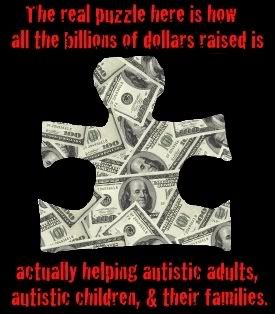





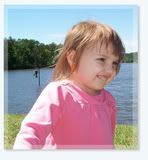

 This Way of Life
This Way of Life

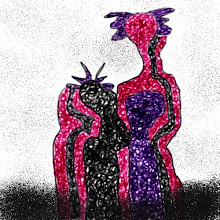

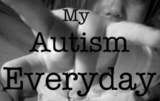





 "Autism is a way of being. It is pervasive; it colors every experience, every sensation, perception, thought, emotion, and encounter, every aspect of existence. It is not possible to separate the autism from the person."
- Jim Sinclair
"Autism is a way of being. It is pervasive; it colors every experience, every sensation, perception, thought, emotion, and encounter, every aspect of existence. It is not possible to separate the autism from the person."
- Jim Sinclair


